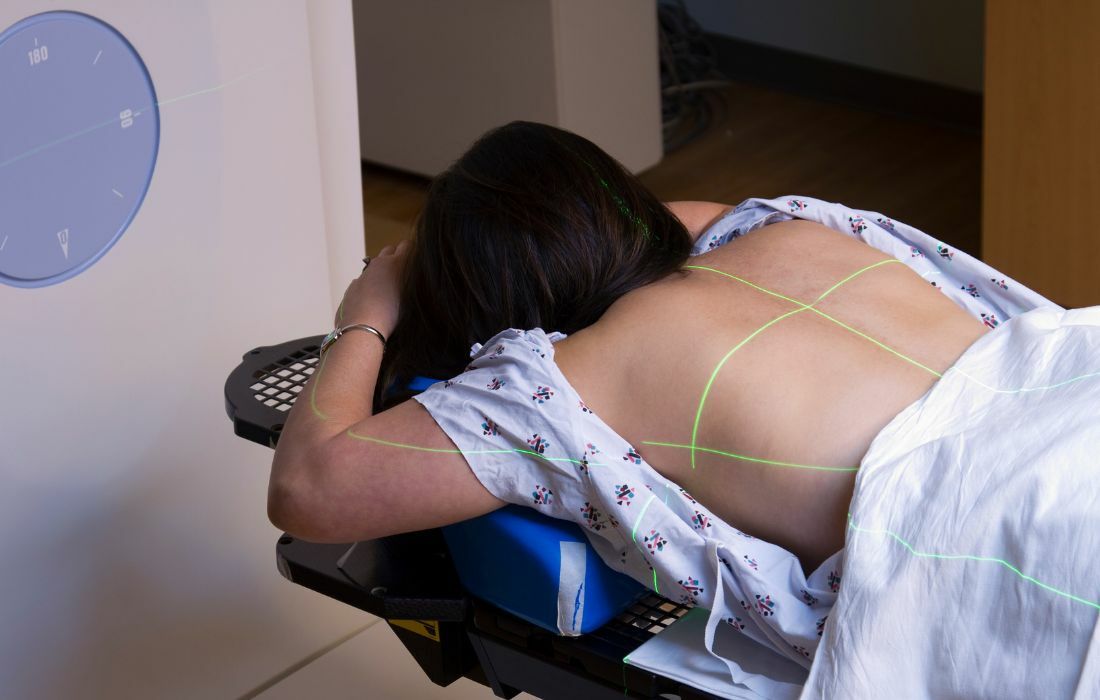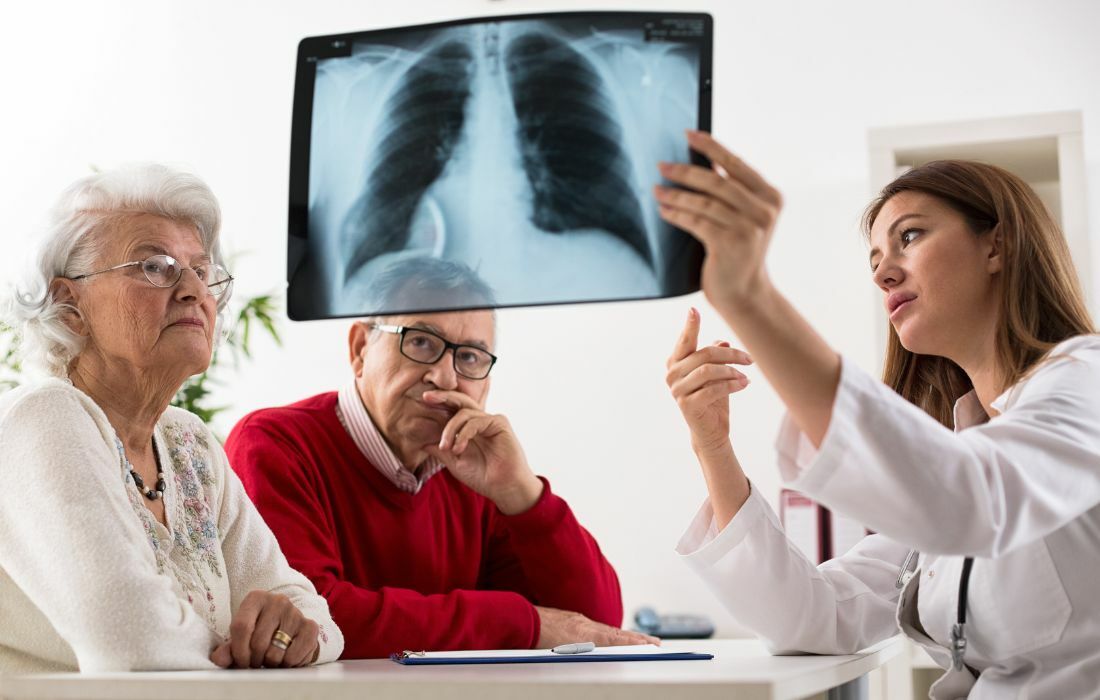Lung Cancer Treatment in Brevard County
The treatment you receive for lung cancer will depend on the type of lung cancer you've been diagnosed with, the stage, and your overall health. The experts at Cancer Care Centers of Brevard will walk you through a personalized lung cancer treatment plan based on your unique diagnosis.
Treating Non-Small Cell Lung Cancer
NSCLC, or non-small cell lung cancer, is the most common type of lung cancer. NSCLC patients are often treated with surgery, chemotherapy, radiation therapy, targeted therapy, or a combination of treatment methods. Patients with stage IV lung cancer, also called metastatic lung cancer, and patients with recurring NSCLC are eligible for biomarker testing to determine if a specific genetic mutation can be treated with targeted therapy. Extensive clinical research is underway to learn more about treatments that can be given specifically to a genetic change in the patient that is causing the cancer to grow.
Treating Small Cell Lung Cancer
Small cell lung cancer (SCLC) patients are typically treated with radiation therapy and chemotherapy. Surgery may also be a part of the treatment plan for these patients. Clinical trials for small cell lung cancer are also underway to improve upon the current treatments and find new therapies to cure SCLC.
About Lung Cancer Treatments
Because every patient’s situation is different, there are a few things to consider before choosing the set of treatments. One of these considerations is where the cancer is located. Surgery is more likely to be included if it’s in a single location than if the cancer has spread throughout a lung (or both lungs).
The right treatment plan is created for you with our team of experts, including the medical oncologist, radiation oncologist, surgeon, and sometimes the pulmonologist.
Patients diagnosed with lung cancer may receive one or a combination of the following treatments:
Advancements in Lung Cancer Treatment
In recent years, treatments approved for lung cancer have advanced, offering more approaches to treating this disease and more treatment options for patients. Watch the video below to learn how immunotherapy, targeted therapies, and clinical trials have progressed for lung cancer treatment.
Chemotherapy for Lung Cancer
Chemotherapy uses drugs to stop cancer cell growth by killing the cells or preventing them from dividing. Lung cancer can spread quickly throughout the body, so chemotherapy is often part of the treatment plan as it can reach the cancer cells that have developed beyond the lungs.
There are two primary ways chemotherapy can be administered. The type and stage of the lung cancer being treated determine how chemotherapy is given.
- Systemic chemotherapy: taken by mouth or injected into a vein or muscle. The chemo drugs enter the bloodstream and can get to cancer cells anywhere in the body.
- Regional chemotherapy: chemotherapy is placed in the spinal column, an organ, or a body cavity directly, such as the abdomen, and it mainly affects cancer cells in those areas.
Radiation for Lung Cancer Treatment
This type of cancer treatment uses high-energy X-rays or other types of radiation to kill cancer cells or stop them from growing. The method of radiation given is determined by the lung cancer type and its stage.
The two types of radiation therapies are:
External radiation therapy: a machine outside the body sends radiation toward the cancer.
Internal radiation therapy: radioactive substances sealed in needles, catheters, seeds, or wires are directly placed into or near the cancer.
Working with a radiation oncologist near your home is important as you will receive daily external radiation therapy for a month or two. Cancer Care Centers of Brevard offers radiation therapy throughout Brevard County, including Melbourne, Merritt Island, and Palm Bay, Florida, so it's convenient for residents of this area to receive this type of cancer treatment.

Surgery to Remove Lung Cancer
Surgery can be used for some patients with early-stage small cell lung cancer, but it is most often used for early-stage NSCLC treatment. It is rarely used as the primary treatment for SCLC as it usually spreads beyond the lungs once this type of lung cancer is detected.Four types of lung cancer surgery are commonly used and involve removing part of the lung or the entire lung. These surgical procedures include lobectomy, segmentectomy, wedge resection, and pneumonectomy. Your lung cancer surgeon will decide the best method for you.After surgery, some patients may be given chemotherapy or radiation therapy, even if all of the cancer is removed during surgery, to kill any cancer cells that may still remain. Cancer treatment after surgery lowers the risk of cancer returning and is called adjuvant therapy.
Immunotherapy for Lung Cancer
Immunotherapy uses drugs to activate the body’s immune system in order to destroy cancer cells. Immunotherapy drugs can come from substances made in the body or in a laboratory and are used to direct or restore the body's natural defenses against cancer.
One type of immunotherapy drug that has been used for the treatment of NSCLC and some advanced SCLC is called checkpoint inhibitors. The proteins on immune cells that need to be turned on (or off) to start an immune response, also known as “checkpoints,” are what the immune system uses to keep itself from killing healthy cells. Immune checkpoints are molecules on the immune cells that can start or stop an immune response. Cancer cells sometimes use these checkpoints to avoid the immune system's attack. By blocking these checkpoints, these medications enable the immune system to recognize and attack cancer cells.
Immunotherapy has advanced as a treatment for lung cancer in recent years, both alone and in combination with chemotherapy or radiation. Current lung cancer research has shown that some patients can have a long-term response to immunotherapy.
Clinical trials are also exploring other types of immunotherapy, such as cancer treatment vaccines (also called therapeutic vaccines) and adoptive T-cell therapy.
Targeted Therapy for NSCLC Based on Biomarker Testing
Targeted therapy focuses on the proteins that control how cancer cells grow, divide, and spread. This approach to cancer treatment is precise and leaves healthy cells unaffected. This reduces the side effects that often come with other methods of treatment, like chemotherapy and radiation therapy.
Three categories of targeted therapy are used to treat specific lung cancer types: monoclonal antibodies, tyrosine kinase inhibitors, and mammalian target of rapamycin (mTOR) inhibitors.
Stage IV or recurring non-small cell lung cancer patients may go through biomarker testing, also called genomic testing, to identify any genetic mutations in the cancer cells. These are not usually hereditary genetic mutations but mutations that have developed over time in the patient.
Several FDA-approved targeted therapies are currently available for non-small cell lung cancer tumors that indicate a mutation in any of the following genes:
- EGFR
- KRAS
- ALK
- ROS-1
- NTRK
- MET
- RET
- BRAF V600E
For patients who do not test positive for a biomarker with an approved targeted therapy, a different treatment plan will be recommended. They may also be eligible for clinical trials that identify treatments based on other biomarkers outside of those associated with established targeted therapies.
Laser Therapy for Lung Cancer
Laser therapy is a form of cancer treatment that uses a high-powered beam of light to kill cancer cells. Occasionally, laser therapy is used to open the airways of a lung cancer patient with difficulty breathing.
Using a bronchoscope, the oncologist inserts the laser and directs the beam at the tumor to burn it. Patients are under general anesthesia, and the treatment may be repeated if needed.
Clinical Trials for Lung Cancer: Advancing the Future of Lung Cancer Treatment
The oncologist may suggest a clinical trial for lung cancer if you are eligible. A treatment clinical trial is a research study meant to help improve current treatments or obtain information on new treatments that aren’t yet widely available for lung cancer. When clinical trials show that a new treatment is better than the standard treatment, the new treatment may become the standard treatment. Patients who have not started treatment may want to consider taking part in a clinical trial.
Learn more about lung cancer clinical trials available at Cancer Care Centers of Brevard.
Follow-up Tests or Check-ups for SCLC and NSCLC
For both small cell lung cancer and non-small cell lung cancer, some of the tests that were done to diagnose lung cancer may need to be repeated to check for the treatment's success. The test results help make decisions about continuing, changing, or stopping treatment. This process is sometimes called re-staging.
After treatment ends, some of these tests will continue to be done from time to time to show if your condition has changed or if the lung cancer has recurred (come back).

The Latest Lung Cancer Treatments Available in Brevard County
If you or a loved one have been recently diagnosed with lung cancer, the lung cancer specialists at Cancer Care Centers of Brevard are here to help you through your journey. We offer the latest treatments available with personalized lung cancer treatment plans tailored to you. Our cancer centers are located throughout Brevard County, including Palm Bay, Rockledge, Melbourne, and Merritt Island, FL.